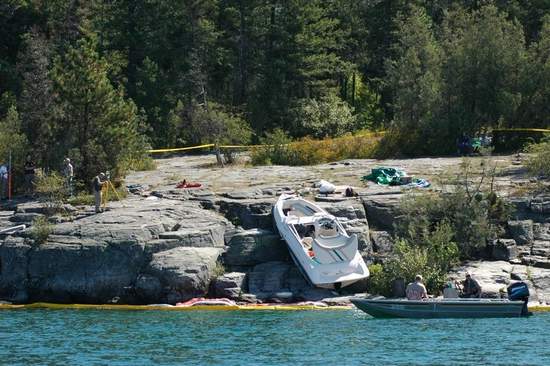Flathead County District Judge John McKeon, of Malta, will consider whether to release the pre-sentence investigation report that was part of the criminal case against former Montana State Sen. Greg Barkus, R-Kalispell.
McKeon ordered all sides in the case to respond by Oct. 23 to a non-profit watchdog group’s request that the court release the pre-sentence investigation report related to the 2009 boat crash which left Barkus, Congressman Denny Rehberg and three others seriously injured. The group, Citizens for Responsibility and Ethics in Washington, wants the documents released before the Nov. 6 election in which Rehberg, a Republican, is challenging incumbent Democratic Sen. Jon Tester for the U.S. Senate.
According to CREW’s Oct. 10 press release:
“CREW requested the PSI to shed light on the true facts surrounding the crash, including the extent to which those facts differ from the version offered by Rep. Dennis Rehberg (R-MT), a passenger on the boat who denied Sen. Barkus was impaired in any way.”
Rehberg’s campaign did not immediately respond to an email seeking comment on CREW’s request or McKeon’s order.
UPDATE: Rehberg’s campaign manager, Erik Iverson, said in a telephone interview Wednesday afternoon that his boss has no control over whether the report is released or not because he is not a party to the case in question.
“Denny was a witness and has no rights or privileges different than any other witness,” Iverson said. “That said, it doesn't matter to Denny what the judge decides. He has no problem with the documents being released at all. He has not seen them or read them, but either way Denny is fine with whatever the judge decides to do."
Barkus, who was the House majority whip at the time, was behind the wheel of the boat that on Aug. 27, 2009 slammed into the rocks on the shore of Flathead Lake near Wayfarers State Park. Court records revealed that Barkus’ blood alcohol content was .16, twice the legal limit of .08, nearly two hours after the crash. Rehberg, two of his staff members and Barkus’ wife were passengers on the boat, and all were seriously injured in the crash. Rehberg denied being impaired himself and said he “saw no signs of impairment” in Barkus.

(You can download the complete audio from Rehberg’s hour-long press conference two weeks after the crash here).
Barkus was charged with criminal endangerment and negligent vehicular assault. McKeon rejected prosecutors’ original plea agreement with Barkus, which called for a three-year deferred sentence, a $4,000 restitution payment and unsupervised probation. McKeon instead imposed a $29,000 fine and a four-year deferred prison sentence.
On Oct. 1 CREW asked McKeon to release the pre-sentence investigation report that the court used to determine Barkus’ sentence. According to court records, the report includes:
- photographs of the crash;
- witness statements;
- the investigating officers’ reports;
- toxicology reports;
- the report of the accident reconstruction expert;
- written or transcribed statements of the the boat’s occupants;
- a history of Barkus’ 2004 conviction on traffic offenses, including the circumstances surrounding the reckless driving conviction in which he was originally charged with driving under the influence of alcohol.
Under state law, McKeon cannot disseminate the pre-sentence investigation report to CREW without first finding “that the demands of individual privacy do not clearly exceed the merits of the public disclosure.”
CREW chief legal counsel Anne L. Weismann argued that the Barkus case involved people in positions of public trust. Barkus was a sitting state senator at the time of the crash and Rehberg, a sitting U.S. Congressman now and at the time of the crash, is running for the U.S. Senate. CREW argued there is “significant public interest in disclosure” to understand the circumstances of the crash and how those circumstances relate to the integrity and judgment of the public officials involved in the crash.
Barkus’ case was ongoing when Rehberg sought reelection to the House in 2010. The case was scheduled to go to trial more than three weeks after the election but the settlement was eventually reached and finalized in January 2011, after Rehberg started his sixth term in Congress.
 According article in the latest issue of The New Republic
According article in the latest issue of The New Republic
















